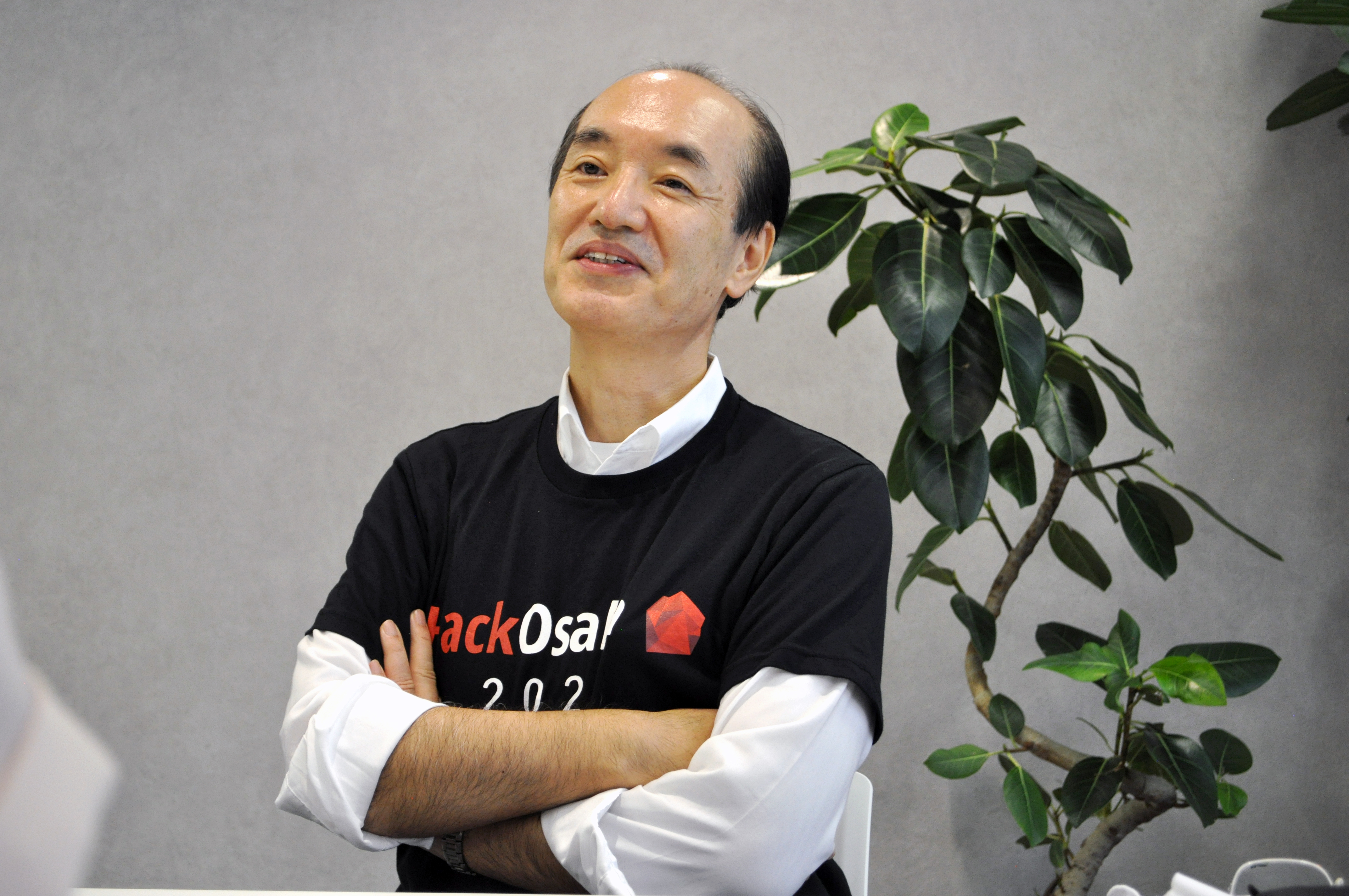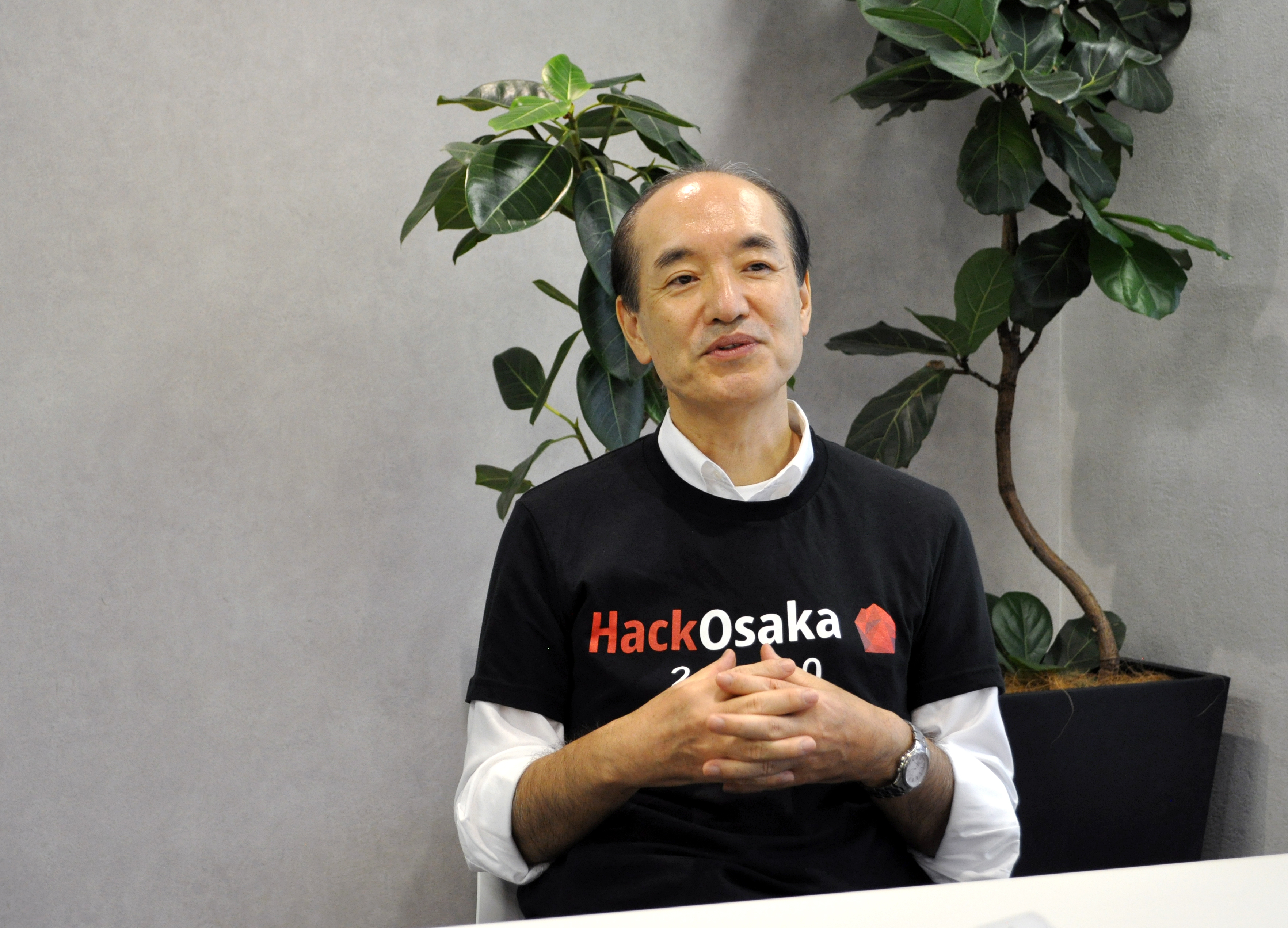
Interviews
Masaaki Yoshikawa: CEO of Human Hub Japan (Former director of Osaka City Economic Strategy Bureau), Masaaki started working in all aspects of innovation administration in the city since 2013. He has been developing the Hack Osaka movement since then to transform Osaka into one single workplace. He serves now as an advisor to Hankyu Hanshin Properties Corp., Japan Startup Support Association, and startup companies ies and others. He is a member of J-Startup recommendation committee endorsed organized by the Ministry of Economy, Trade and Industry (METI); a member of the same ministryMETI’s Kansai Venture Supporters Conference; Business Consultant Registered with METI.

I’m an advisor to Hankyu Hanshin Properties Corp., which operates GVH#5, where my company, Human Hub Japan, is located.
I started working in innovation administration for Osaka City after I left the IT industry, where I had worked for about 20 years. In IT, I’d been working on new business development for a typical big Japanese company, so I have experience working both at large corporations and on the development of new businesses.
Because of my experience in both government and a small startup organization established by large corporations, I think that my role at GVH#5 is to help connect startups and big corporations.
Since I began my time in Osaka City, I’ve been working on developing Hack Osaka, to make the whole of Osaka a city of co-creation. The idea is to make the entire city into one big workplace.
I think my experience seeing the IT revolution up close in the 1980s has a lot to do with it.
When I was working in IT, we had partner companies in Boston and Silicon Valley, but those companies would disappear one after another—that was how fast the industry was moving.
In that situation, someone I would meet at one company would end up at another company. They weren’t so much applying to jobs in companies; they were applying to jobs in the industry as a whole.
Also, the industry itself was rooted in those regions, so these guys would be sharing information with one another over breakfast. I’ve come to think that revitalizing the city would lead to the entire city becoming a place of work based on this kind of experience.

If you’re looking to do business in Japan’s domestic market, then yes, Tokyo has an advantage, but if you’re going to do business with people overseas, there are great opportunities away from the city.
We’re hoping to grow startups here with technology that can only be found in Osaka. There are concentrations of technology in the form of universities in Osaka, Kyoto, and Hyogo. If you have technology as your base, you can take on the world.
Universities already have tech, so if you add some business perspective there, I believe you can build industry-academia collaborative projects.
If you’re dealing with people from around the world, there’s no need to go to Toyko. Technical manufacturers in Kyoto, for example, embody this idea, and they still have their headquarters in Kyoto. From there, we have our gaze fixed directly overseas.
GVH#5 is home to the Japanese headquarters of the major British startup supporter Rainmaking Co., Ltd., and its direct network overseas is also a great strength.
I think Osaka has a lot of “venture spirit.
Even if you go back in history, you’ll find that Osaka started as a merchant town, and it has produced many innovative entrepreneurs.
Osaka’s merchant culture began forming long ago, in the Edo Period (17th-19th century). Since Osaka was under the direct control of the Edo Shogunate, there were very few samurai, so instead of following the samurai’s operating style of obeying rules, a free-spirited culture flourished under the influence of the merchants.
The world’s first futures trading was also born in Osaka. That was also during the Edo Period. It was begun at a rice market originally opened by a wealth Osaka rice merchant, Jo-an Yodoya.
Jo-an Yodoya left behind the words, “Give before you get (Eru yori saki ni ataeyo).” This is just the same as the words of Brad Feld, a respected investor in the startup community, who also said, “Give before you get.”
Because of Osaka’s history of prior investment, the people here have a philosophy of co-existence and co-prosperity, in which making the pie of credit and the market as a whole bigger also helps to bring you up to the top. You could say it’s in the DNA of Osaka people.
Ichizo Kobayashi, who founded the Hankyu Group, was also a venture entrepreneur.
The idea of developing railways together with the housing and commercial facilities along the rail lines was also a part of this “co-existence and co-prosperity” business model, and the first of its kind in the world.
There’s also a community created by founding members of the IT industry, the Japan Association of New Economy, and when I looked up the birthplaces of the board members, I found that 46% of them were from the Kansai region.
That age-old venture spirit is still alive and well in Osaka today.

GVH#5 can help introduce people, or offer knowledge tailored to any difficulties members might be facing.
For example, we provided information on tax incentives to an entrepreneur who was thinking of creating a business that would donate a portion of the money you pay when eating out.
When you start a new job, you’re wanting for information, so having staff members and other entrepreneurs around you in this environment where you’re able to ask for that information is a huge merit. Through Rainmaking, GVH#5 also provides connections to large companies to startups considering developing their businesses in Japan.
Also, as a whole, in Osaka the mindset is to look at the essence of person, without being bound by titles and conventions, so that may also make it easier for non-Japanese people to enter the market.
An organization called the Osaka Startup Ecosystem Consortium has been formed. It brings together Osaka Prefecture, Osaka City, Sakai City, the Osaka Business Development Agency, economic organizations, universities, and so on, to build an environment in which globally-expanded startups can continually be born in Osaka.
This organization has also partnered with consortiums in Kyoto and Hyogo/Kobe, and in 2020 was selected as the country’s “Global Hub City.”
In the future, with the national government’s support, I’m sure the cooperative movements between Osaka, Kyoto, and Kobe will continue to be strengthened.
There’s also a movement to gather together startups at the 2025 Expo who are looking to provide products and services for a future society.
Speaking of the future, the Umekita area on the north side of JR Osaka Station is currently being re-developed, and its second phase opening is scheduled for 2024. GVH#5 has become an important player in the development of Umekita.
When Umekita opens, we’ll be able to create a large innovation hub located just 30 minutes from Kobe, and 30 minutes from Kyoto. This also seems to be a factor in spurring on cooperation in the entire Kansai region.
In the Umekita area, there are already the national research institutes and universities, patent offices, the Ministry of Economy, Trade and Industry; Ministry of Education, Culture, Sports, Science and Technology, and other national support organizations that gathered here during the first phase opening of the area, so we’re trying to create even more connections during the second phase opening.

GVH#5 gathers together the information that forms the center of Osaka’s startup ecosystem. It’s the perfect place to better understand the city, and the ecosystem as a whole.
There’s a screening process for entry, and we’re looking for ambitious people. We’re hoping our members will work hard, working off the other members, achieve great growth here, and expand internationally.
GVH#5 is a bit different from other rental offices and coworking spaces, in that it doesn’t intend to make a profit from the rental fees.
The goal is to create an ecosystem of “co-existence and co-prosperity,” in which the companies that have grown here eventually return profits to the region and the companies that have supported them along the way.
There are still few angel investors in Japan, and startup growth still takes some time. I think the solution to this is large corporations, who can serve a kind of angel-like role. GVH#5 has strong ties to big corporations, and we want to help with making these companies serve such roles.
We welcome people with curiosity, ambition, and initiative; those who can passionately scale their business.